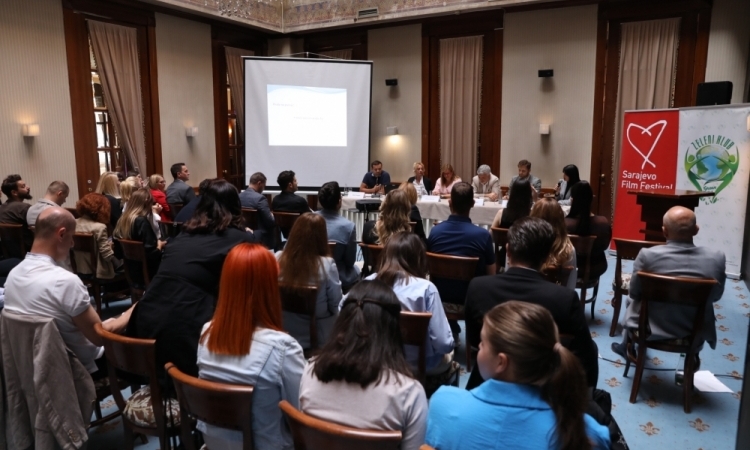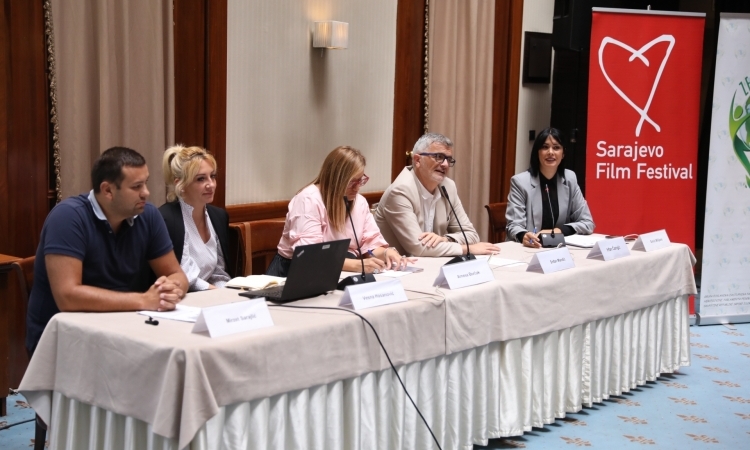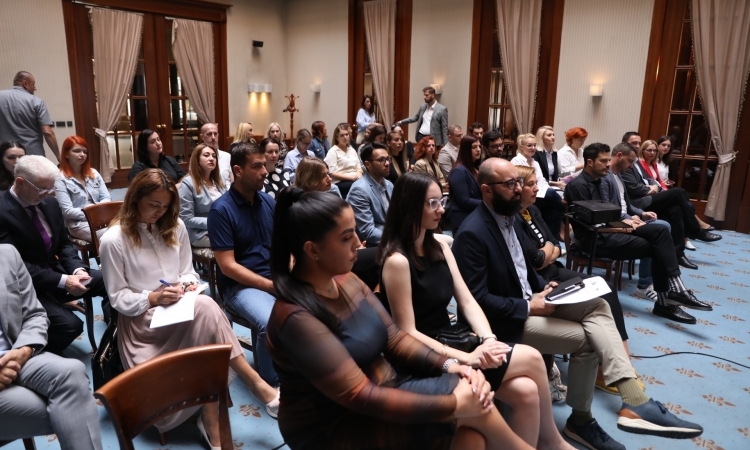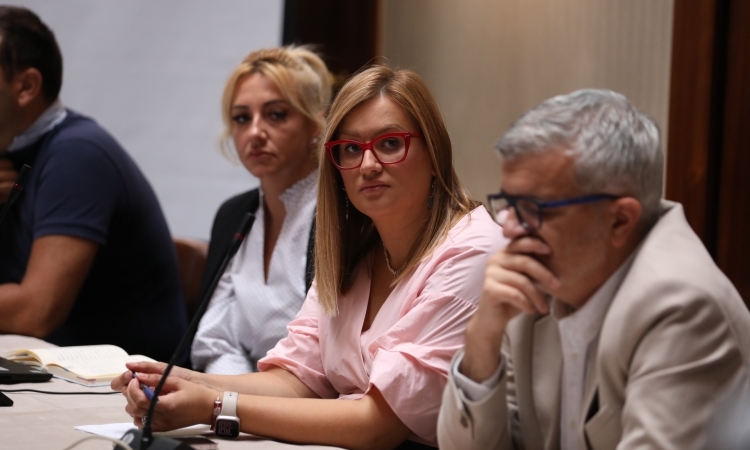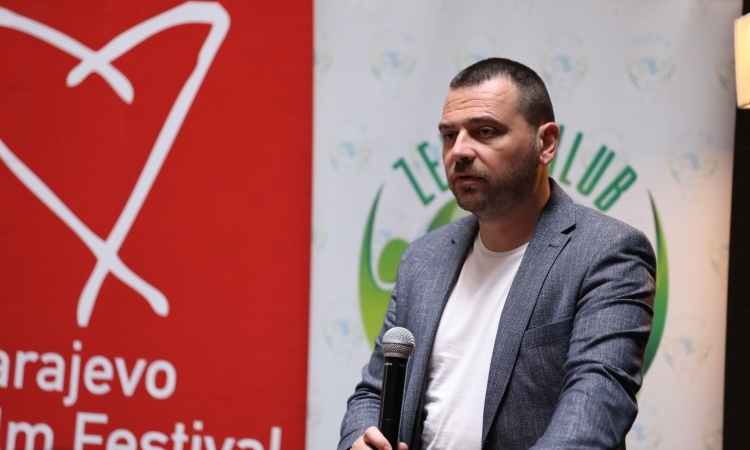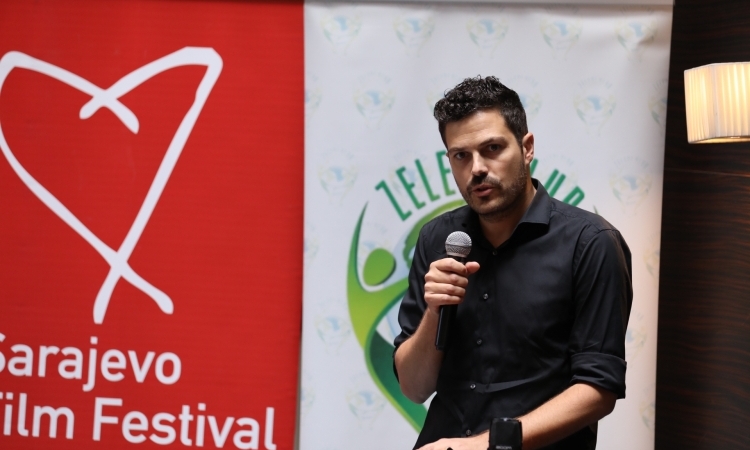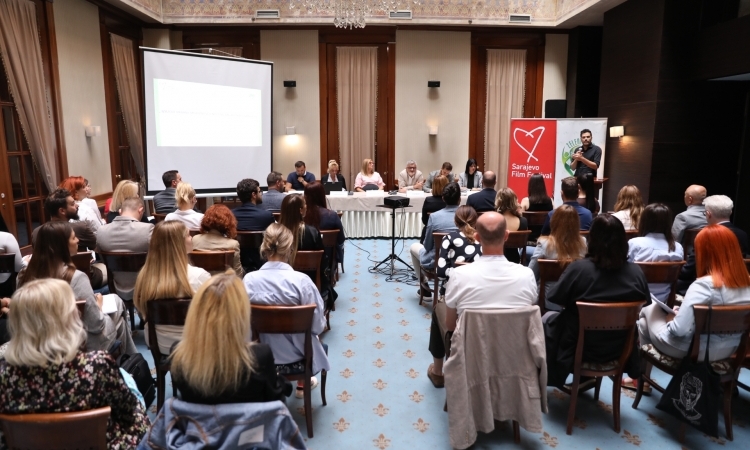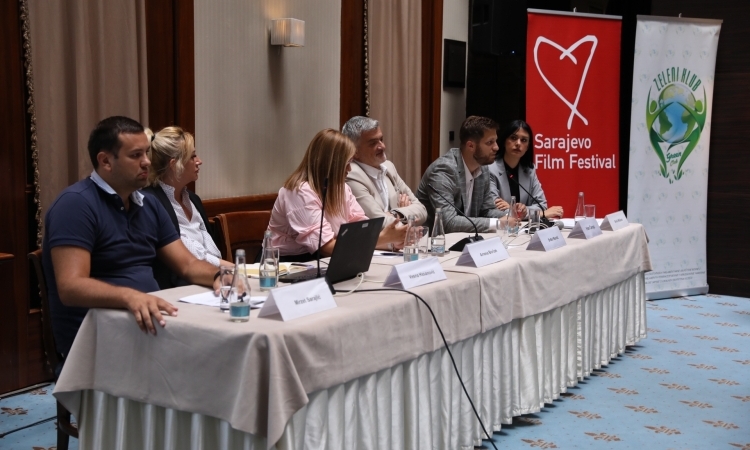News
"Challenges of Urban Mobility and Zero Pollution in Sarajevo": Concrete initiatives for a sustainable future of the city
The Director of the Sarajevo Film Festival, Jovan Marjanović, pointed out that this panel was a continuation of the joint activities of the Green Club and the Sarajevo Film Festival
The panel discussion "Challenges of Urban Mobility and Zero Pollution in Sarajevo", organized by the Green Club (orig. "Zeleni klub") consisting of the Sarajevo Film Festival and the MPs of parliaments in Bosnia and Herzegovina, with the support of the United Nations Development Programme in Bosnia and Herzegovina (UNDP), was held today at the Hotel Europe in Sarajevo, as part of the European Mobility Week, with this year's theme being "Save energy".
The aim of the panel was to raise public awareness of activities that can lead to zero pollution, actions in the fields of environmental protection, use of clean and renewable energy sources, energy efficiency, with an emphasis on urban mobility.
The panel was opened by MP in the House of Representatives of the Parliamentary Assembly of BiH and President of the Green Club Saša Magazinović and Director of the Sarajevo Film Festival Jovan Marjanović.
"This year, together with the Sarajevo Film Festival, we have created the basis for future activities. The Sarajevo Film Festival has a huge impact and importance not only for cinema, but also for society, and we have in some way used it as a tool to point out some problems. In addition, the Sarajevo Film Festival is one of the few organizations that is critical of its activities, so it produced a study and measured its impact on the environment. Some results of this year's cooperation are already being seen," Magazinović said.
The Director of the Sarajevo Film Festival, Jovan Marjanović, pointed out that this panel was a continuation of the joint activities of the Green Club and the Sarajevo Film Festival. For the Festival, cooperation with the Green Club and all levels of government is of utmost importance in order to establish legislation that will enable better urban mobility and the use of renewable energy sources for sustainable development.
"By making an inventory of greenhouse gas emissions caused by the organization of the Sarajevo Film Festival, we tried to give ourselves ambitious but realistic deadlines for how to reduce some of the emissions to zero by the 30th edition of the Festival and thus contribute to a wider agenda of Sarajevo being a city with zero greenhouse gas emissions in 2030. We support and will support all infrastructure works that contribute to the use of environmentally neutral means of transport, however challenging it may be for the festival organization in the year when the works are carried out. The Sarajevo Film Festival that is behind us was the largest so far in terms of the number of guests, the number of tourists who came to Sarajevo and the number of challenges it brought to the infrastructure in Sarajevo. Our study showed that most of the greenhouse gases produced by the organization of the Sarajevo Film Festival come from intercity and international transport, and a survey conducted this year among guests and visitors of the Festival shows that only 8 percent of them use railways as a means of transport. We hope to reach 80 percent through joint initiatives and activities. The Sarajevo Film Festival, as an event that has great cultural, economic and social significance, has the ability and power to convey the message of responsibility for environmental awareness to more people, and we hope that these activities will result in concrete positive initiatives, some of which have already been adopted and are being implemented, "Marjanović said.
Vesna Hasanović, on behalf of the Sarajevo Canton Tourist Board, said that they recognize important stories and projects and contribute, in accordance with their abilities, in order to create better conditions for the development and improvement of tourism, so that their primary activity – the promotion of tourism, would be as successful as possible.
"As an example of positive action, we can point out that in August last year we were the first in Sarajevo Canton, and throughout BiH, to set up recycling machines. Although this is not our primary activity, we have shown that action can and should be taken to preserve the environment and create new habits, which in this case had a humanitarian character (part of the money went to humanitarian purposes for the organization Pomozi.ba). Within a year, four more recycling plants, in addition to our two, were installed at several locations in the city and the project proved to be successful during the first year – more than 250,000 units of packaging waste were collected," Hasanović explained.
Srđan Mandić, Mayor of the Municipality of Centar Sarajevo, spoke, among other things, about electric vehicles and about the effort to make parks in this municipality more functional:
“We want our parks and green spaces to be places where you stay, not just walk through. One current example that will change the image of the municipality of Centar is Jezero Park. It is one of the largest parks in Sarajevo Canton, which will be made available to citizens in about 20 days," Mandić said.
Mirzet Sarajlić from the Ministry of Transport of Sarajevo Canton said that the means of environmentally sustainable urban mobility are not only means that contribute to the reduction of pollution, but are also means that save lives.
"As the Ministry of Transport, we have great resistance when it comes to the organization of traffic and street closures, which basically tells us that our society is not yet mature enough to accept changes, although these are not really changes, but European practices that have been alive for 20, 30, and more years. I will remind you that during the Sarajevo Film Festival we closed some roads, and continuously, step by step, we are taking steps to get as few cars as possible into the city center and to use bicycles as much as possible."
Arnesa Borčak, head of the project "Green Economic Development" implemented by the UNDP in BiH and funded by Sweden, talked about the importance of e-mobility.
“E-mobility is our future, an area that is evolving and expanding around the world. In our country, this area is developing in a sporadic way. UNDP, thanks to the Government of Sweden and in cooperation with the Ministry of Foreign Trade of BiH, made a comprehensive study of electromobility for BiH. Through this study, we identified all the necessary steps to establish legislation in this area, and all the key actors that need to be actively involved in order for e-mobility to start developing the market."
Irfan Čengić, an MP in the House of Peoples of the Parliament of the Federation of BiH, said that much had been done by introducing new trolleybuses into public transport, as well as by reconstructing the existing and building a new tram line.
“I think new technologies can make a big difference to public transport. The use of public transport would certainly increase if there were apps for timetables that would accurately indicate the time of arrival of vehicles, and thus citizens could plan their time."
The panel discussion "Challenges of Urban Mobility and Zero Pollution in Sarajevo" was another opportunity to point out the need for strong and concrete institutional, but also individual engagement in the fight against climate change and raising awareness of the necessity of environmental protection.
The aim of the panel was to raise public awareness of activities that can lead to zero pollution, actions in the fields of environmental protection, use of clean and renewable energy sources, energy efficiency, with an emphasis on urban mobility.
The panel was opened by MP in the House of Representatives of the Parliamentary Assembly of BiH and President of the Green Club Saša Magazinović and Director of the Sarajevo Film Festival Jovan Marjanović.
"This year, together with the Sarajevo Film Festival, we have created the basis for future activities. The Sarajevo Film Festival has a huge impact and importance not only for cinema, but also for society, and we have in some way used it as a tool to point out some problems. In addition, the Sarajevo Film Festival is one of the few organizations that is critical of its activities, so it produced a study and measured its impact on the environment. Some results of this year's cooperation are already being seen," Magazinović said.
The Director of the Sarajevo Film Festival, Jovan Marjanović, pointed out that this panel was a continuation of the joint activities of the Green Club and the Sarajevo Film Festival. For the Festival, cooperation with the Green Club and all levels of government is of utmost importance in order to establish legislation that will enable better urban mobility and the use of renewable energy sources for sustainable development.
"By making an inventory of greenhouse gas emissions caused by the organization of the Sarajevo Film Festival, we tried to give ourselves ambitious but realistic deadlines for how to reduce some of the emissions to zero by the 30th edition of the Festival and thus contribute to a wider agenda of Sarajevo being a city with zero greenhouse gas emissions in 2030. We support and will support all infrastructure works that contribute to the use of environmentally neutral means of transport, however challenging it may be for the festival organization in the year when the works are carried out. The Sarajevo Film Festival that is behind us was the largest so far in terms of the number of guests, the number of tourists who came to Sarajevo and the number of challenges it brought to the infrastructure in Sarajevo. Our study showed that most of the greenhouse gases produced by the organization of the Sarajevo Film Festival come from intercity and international transport, and a survey conducted this year among guests and visitors of the Festival shows that only 8 percent of them use railways as a means of transport. We hope to reach 80 percent through joint initiatives and activities. The Sarajevo Film Festival, as an event that has great cultural, economic and social significance, has the ability and power to convey the message of responsibility for environmental awareness to more people, and we hope that these activities will result in concrete positive initiatives, some of which have already been adopted and are being implemented, "Marjanović said.
Vesna Hasanović, on behalf of the Sarajevo Canton Tourist Board, said that they recognize important stories and projects and contribute, in accordance with their abilities, in order to create better conditions for the development and improvement of tourism, so that their primary activity – the promotion of tourism, would be as successful as possible.
"As an example of positive action, we can point out that in August last year we were the first in Sarajevo Canton, and throughout BiH, to set up recycling machines. Although this is not our primary activity, we have shown that action can and should be taken to preserve the environment and create new habits, which in this case had a humanitarian character (part of the money went to humanitarian purposes for the organization Pomozi.ba). Within a year, four more recycling plants, in addition to our two, were installed at several locations in the city and the project proved to be successful during the first year – more than 250,000 units of packaging waste were collected," Hasanović explained.
Srđan Mandić, Mayor of the Municipality of Centar Sarajevo, spoke, among other things, about electric vehicles and about the effort to make parks in this municipality more functional:
“We want our parks and green spaces to be places where you stay, not just walk through. One current example that will change the image of the municipality of Centar is Jezero Park. It is one of the largest parks in Sarajevo Canton, which will be made available to citizens in about 20 days," Mandić said.
Mirzet Sarajlić from the Ministry of Transport of Sarajevo Canton said that the means of environmentally sustainable urban mobility are not only means that contribute to the reduction of pollution, but are also means that save lives.
"As the Ministry of Transport, we have great resistance when it comes to the organization of traffic and street closures, which basically tells us that our society is not yet mature enough to accept changes, although these are not really changes, but European practices that have been alive for 20, 30, and more years. I will remind you that during the Sarajevo Film Festival we closed some roads, and continuously, step by step, we are taking steps to get as few cars as possible into the city center and to use bicycles as much as possible."
Arnesa Borčak, head of the project "Green Economic Development" implemented by the UNDP in BiH and funded by Sweden, talked about the importance of e-mobility.
“E-mobility is our future, an area that is evolving and expanding around the world. In our country, this area is developing in a sporadic way. UNDP, thanks to the Government of Sweden and in cooperation with the Ministry of Foreign Trade of BiH, made a comprehensive study of electromobility for BiH. Through this study, we identified all the necessary steps to establish legislation in this area, and all the key actors that need to be actively involved in order for e-mobility to start developing the market."
Irfan Čengić, an MP in the House of Peoples of the Parliament of the Federation of BiH, said that much had been done by introducing new trolleybuses into public transport, as well as by reconstructing the existing and building a new tram line.
“I think new technologies can make a big difference to public transport. The use of public transport would certainly increase if there were apps for timetables that would accurately indicate the time of arrival of vehicles, and thus citizens could plan their time."
The panel discussion "Challenges of Urban Mobility and Zero Pollution in Sarajevo" was another opportunity to point out the need for strong and concrete institutional, but also individual engagement in the fight against climate change and raising awareness of the necessity of environmental protection.






